|
|
|
Sort Order |
|
|
|
Items / Page
|
|
|
|
|
|
|
| Srl | Item |
| 1 |
ID:
113836


|
|
|
|
|
| Publication |
2012.
|
| Summary/Abstract |
This article analyzes how exchange participants in university-industry agricultural biotechnology research collaborations manage and create differences between the academy and industry with regard to the open dissemination and commercialization of scientific knowledge. Our focus is on the constitutive relations that define the boundary between academic and commercial science. We identify a particular "relational package" that formalizes and standardizes exchanges of money from industry for privileged access to university research discoveries. Our analysis of academic scientists' justificatory narratives about their patenting decisions challenges the oft-made assertion that academic patenting on its face should be taken as evidence of a blurred institutional boundary between academic and commercial science.
|
|
|
|
|
|
|
|
|
|
|
|
|
|
|
|
| 2 |
ID:
141401
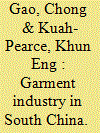

|
|
|
|
|
| Summary/Abstract |
Since the implementation of China’s economic reform and opening-up policy at the end of the 1970s, garment manufacturing for both the domestic and global markets has developed and proliferated quickly in Guangzhou-centred South China. It is believed to be the result of the industrial restructuring of the global apparel commodity chain and a large domestic consumer demand from the Chinese people. Compared with other industries, the garment industry has long been subject to the strong impact of a transitional market economy and, more recently, the increasingly rapid process of marketisation in China. In order to provide a clear sociological conceptualisation of the market economy in the reform era, this paper aims to apply the relational work approach to analysing economic transactions in the garment business, particularly business dealings between garment producers and wholesalers. The focus is on their continued efforts to make appropriate economic arrangements in accordance with specific sets of social relations through continuous relational work. This paper will examine three categories of relational work and the associated economic forms in the making. First, it will explore families and the household economy; second, it will examine relatives and friends and the favour-based economy; and third, it will study strangers and the market economy. Through the use of this relational work framework, this paper will shed light on how the different sets of relational work help us to understand relationships and embeddedness between garment producers and wholesalers in China’s rapidly evolving garment economy.
|
|
|
|
|
|
|
|
|
|
|
|
|
|
|
|
| 3 |
ID:
113831
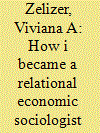

|
|
|
|
|
| Publication |
2012.
|
| Summary/Abstract |
My paper proposes the concept of relational work to explain economic activity. In all economic action, I argue, people engage in the process of differentiating meaningful social relations. For each distinct category of social relations, people erect a boundary, mark the boundary by means of names and practices, establish a set of distinctive understandings that operate within that boundary, designate certain sorts of economic transactions as appropriate for the relation, bar other transactions as inappropriate, and adopt certain media for reckoning and facilitating economic transactions within the relation. I call that process relational work. After identifying specific elements of a relational work approach, the paper focuses on the case of monetary differentiation. It compares a relational work theory of earmarking money with behavioral economics' individually based mental accounting approach.
|
|
|
|
|
|
|
|
|
|
|
|
|
|
|
|
| 4 |
ID:
113834


|
|
|
|
|
| Publication |
2012.
|
| Summary/Abstract |
California is the global hub for assisted reproductive technology practices, including egg donation. The rise of egg donation in the United States is surprising given the cultural context linking genetics and motherhood and rejecting the commodification of reproduction. Scholars in the hostile worlds camp have grappled with the relationship between intimacy and economics, yet employing this theory to explain the increase in egg donation is unsatisfactory. The concept of relational work, developed by Viviana Zelizer, provides scholars with a robust analytical tool to account for the rise in egg donation. This paper analyzes the relational work of egg donors and fertility center staff. I argue that donors and staff construct an understanding of egg donation that avoids directly challenging the cultural context mentioned above. Analyzing egg donation as a case of relational work demonstrates the need to move beyond the reciprocity/market dichotomy upheld by the hostile worlds framework.
|
|
|
|
|
|
|
|
|
|
|
|
|
|
|
|
| 5 |
ID:
113833
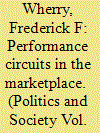

|
|
|
|
|
| Publication |
2012.
|
| Summary/Abstract |
This paper introduces the concept of performance circuits as a means for understanding economic transactions. The concept of the performance circuits emphasizes the script-like sequences and the existing cultural narratives that enable the believable performances of those scripts. The concept of performance circuits allows for Zelizer's concept of relational work to be applied in ethnographic studies of economic life, decomposing the constituent parts that enable the accomplishment of value in the marketplace. The paper opens with a dramaturgical performance at the United States Federal Reserve and then turns to microstudies of handicraft production, modern art markets, and neighborhood branding to demonstrate how one can study market dramas unfolding, sometimes unremarkably, emotions being generated, and background representations making loosely scripted actions understandable.
|
|
|
|
|
|
|
|
|
|
|
|
|
|
|
|
| 6 |
ID:
113832
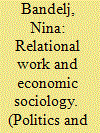

|
|
|
|
|
| Publication |
2012.
|
| Summary/Abstract |
This paper attempts to clarify the concept of relational work for understanding economic life as proposed by Viviana Zelizer. To do so, it first compares the concept to similar notions used in other disciplinary fields. Second, it reinterprets some exemplary economic sociology studies by using the relational work lens to clarify the concept's utility for empirical analysis. Third, it speculates about the place of relational work in the theoretical toolkit of economic sociologists, in particular its relation to embeddedness. The paper concludes by arguing for the utility of the concept to integrate structural, cultural, and power-focused analyses of economic life, to highlight the often-overlooked role of emotions in economic exchange, and to ground an alternative to rational action theory in economic sociology.
|
|
|
|
|
|
|
|
|
|
|
|
|
|
|
|
| 7 |
ID:
113835
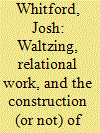

|
|
|
|
|
| Publication |
2012.
|
| Summary/Abstract |
The article uses a case study of relationships in American manufacturing industries to demonstrate the utility of documenting the "relational work" that managers do as they negotiate circumstances where either roles or norms are ambiguous. It shows that the explicit identification of the role that relational work plays in those relationships story militates for-and extends, improves upon, and arguably completes-a particular understanding of what economic sociologists should mean when they talk about the "embedding" of the economic in social relations. The article hence shows the utility of jointly using otherwise disparate perspectives in the analysis of interorganizational relationships, and thus contributes to the development of a more unified paradigm in economic sociology.
|
|
|
|
|
|
|
|
|
|
|
|
|
|
|
|
|
|
|
|
|